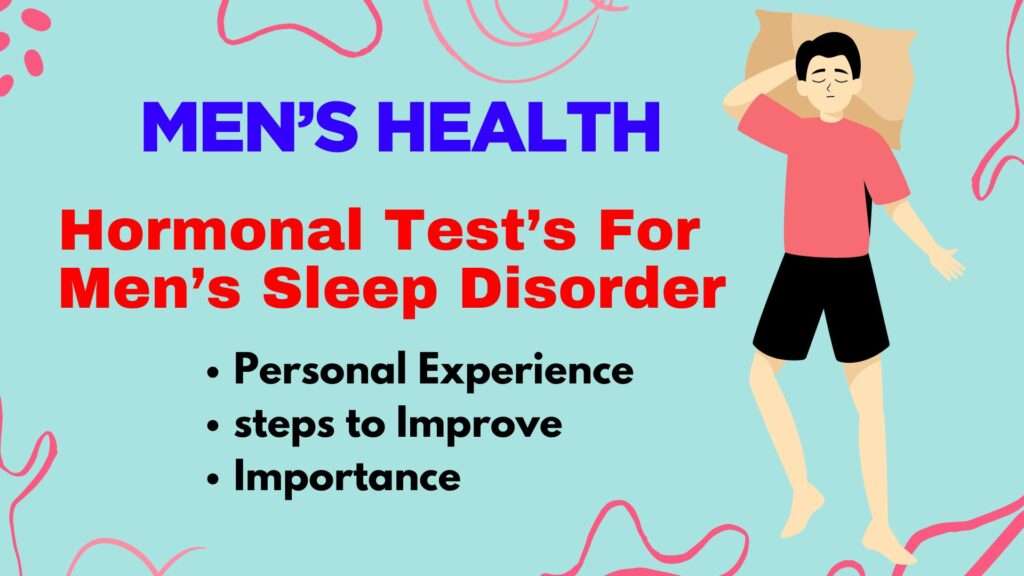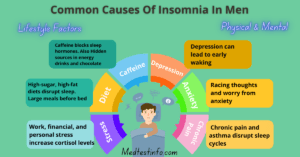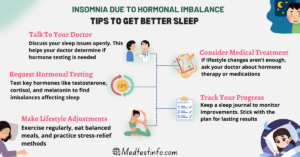
Overview
Have you ever felt that you cannot sleep at night or are not getting enough sleep you need? These are painful moments, and as time passes, they impact your daily routine, such as mood, health, and performance.
If you’re a guy dealing with a sleep disorder, you may consider some causes. These causes could include stress, diet, or excessive coffee consumption, but have you ever thought that your hormones could be responsible for it? Indeed, this is not the reason that immediately comes to mind, but the hormonal imbalance has a profound connection with sleep disorders in men.
This article explores how hormone tests can help diagnose sleep disorders in men. We will share personal experiences and insights with you. This enables you to determine the need for hormonal testing related to sleep disorders and its importance. The reason for these tests. With that, you can easily overcome this disorder and get your sleep back on schedule.
Hormones And Sleep Problems
As men, we often overlook the significant hormonal impacts on our everyday experiences. Our key topic is the connection of hormones with sleep. However, some hormones, e.g., testosterone, cortisol, and melatonin, deeply connect with our sleep. Let us go towards its explanation;
Testosterone
Testosterone, known as a male sex hormone, is essential for various functions, including sleep. According to research, a moderate amount of testosterone hormone can cause poor sleep quality, insomnia, and sleep apnea. As one age, the level of testosterone hormone decreases, which is why older men often complain about lack of sleep.
Cortisol
Cortisol, also called the stress hormone, is another hormone deeply connected with sleep. It increases slowly in the morning, making it easier to wake up from sleep. Similarly, it gradually decreases during the day.
However, if your cortisol level goes up at night, it keeps you awake, and you may have difficulty falling asleep. This creates a harmful cycle where insufficient sleep increases your cortisol, which can further disturb your sleep.
Melatonin
Melatonin, also called sleep hormone, helps us maintain our sleep-wake cycle. The pineal gland in the brain produces melatonin, and the melatonin hormone level increases in the evening, helping men prepare for sleep.
However, if your body is not producing melatonin in sufficient quantity, you may have trouble sleeping. Too much screen time or inconsistent sleep can significantly reduce melatonin levels, leading to sleep difficulties.

Common Cause Of Insomnia In Men
Insomnia is a common problem that can decimate a man’s quality of life. While temporary drowsiness is common, severe insomnia can cause long-term health consequences. Understanding the most prevalent causes of insomnia is critical for developing effective treatments. Several reasons can contribute to restless nights in males, including lifestyle choices, health difficulties, and frequently missed hormone abnormalities.
Lifestyle Factors: Stress, Diet, and Caffeine
Stress is one of the leading causes of sleeplessness in males. Daily duties, professional challenges, money problems, and personal relationships can increase stress levels. When stress becomes chronic, it activates the body’s “fight or flight” response, releasing hormones such as cortisol, making it difficult to relax and sleep.
The diet also influences sleep quality. A diet heavy in processed foods, sweets, and bad fats can cause energy fluctuations that disrupt sleep patterns. Eating large or heavy meals close to bedtime might disturb digestion, making it difficult to fall asleep. In contrast, a well-balanced diet high in nutrients, lean proteins, and healthy fats will help you sleep better.
Caffeine use, particularly later in the day, is another lifestyle component that may keep males awake at night. As a stimulant, caffeine inhibits the effects of adenosine, a hormone that promotes sleep, making it more difficult to relax. Many men inadvertently ingest caffeine from hidden sources, such as energy drinks, soda, and even chocolate, which may cause sleep problems.
Physical And Mental Health Issues Causing Insomnia
Physical and mental health issues are also significant contributors to sleeplessness. Chronic discomfort, asthma, and gastrointestinal disorders all make it difficult to fall and remain asleep. Pain and discomfort disturb sleep cycles, limiting deep and restful sleep.
On the mental health side, anxiety and depression are frequently associated with insomnia. Anxiety can cause excessive worry, racing thoughts, and restlessness, making it difficult to sleep at night. Depression, while often connected with excessive sleep, can also result in early waking or difficulties falling asleep.
My Personal Experience With Sleep Disorders
I am sharing my personal story with you to learn how hormones can spoil your sleep. A few years ago, I had to face the problem of sleeplessness. No matter how much I tried to sleep, I could not sleep and remained awake the whole night. Because of this, my mental health and work productivity were affected. Earlier, I thought that this was happening because of anxiety or stress, but the matter is getting more serious.
Recently, I went to a doctor who suggested some hormonal tests. The results were shocking. My testosterone levels were deficient for my age. My cortisol level was already high, even though it should have been lower.
After realizing this, the doctor was successful in recovering my hormonal imbalance. He suggested essential lifestyle changes to me, including diet and advice to reduce stress, e.g., meditation and supplements. The best results came out, and I started to sleep peacefully.
Importance Of Hormonal Testing
From my personal experience, I have learned that sleeplessness is not always because of external factors. Sometimes, the issue is mainly in your hormones. This is the reason hormonal testing is essential for men who have difficulty sleeping.
The hormonal test requires a blood sample from you. The lab will measure this sample’s critical testosterone, cortisol, and melatonin levels. These tests help you know which hormone is more or less, which makes it easier for your doctor to treat you.
For example, if the problem is low testosterone, your doctor may suggest some lifestyle changes, such as regular exercise, proper diet, and, if possible, testosterone replacement therapy. If the problem is high cortisol, you must manage your stress. Adjusting the diet and taking some supplements can also help.

How To Get Better Sleep
If you cannot sleep and think it might be because of an imbalance in your hormones, follow these steps to improve your sleep quality and general health. Factors such as stress, poor diet, lack of exercise, or certain medical conditions could cause an imbalance in your hormones.
Talk To Your Doctor
First, make an appointment with your doctor to discuss your sleep problems. Describe your symptoms, such as having trouble sleeping, waking up often, or feeling tired even after a night’s sleep. Tell your doctor everything wholly and honestly to help them understand your situation and decide if hormone testing is necessary.
Request Comprehensive Hormonal Testing
Ask your doctor to check the levels of essential hormones like testosterone, cortisol, and melatonin if they think an imbalance in your hormones could keep you from sleeping. Testosterone gives you energy and can change the quality of your sleep. Sleep problems may arise when cortisol levels are high, which can happen because of stress. Low melatonin levels can make it hard to keep a regular sleep-wake cycle. Your doctor can help you create a more effective treatment plan once you know your hormone levels precisely.
Make Lifestyle Adjustments
After looking at the results of your hormone tests, your doctor may suggest that you change your lifestyle to help keep your hormones in balance and improve the quality of your sleep. Adding mild exercise to your daily routine can help you sleep better, feel less stressed, and have more energy. To give your body the nutrients to keep hormones stable, eat a balanced meal full of protein, healthy fats, vitamins, and minerals. Meditation, breathing exercises, yoga, and other stress-reduction methods can help lower cortisol levels and prepare your body for a good night’s sleep. Depending on your needs, your doctor may also suggest vitamins that can help you sleep, such as magnesium or melatonin.
Consider Medical Treatment If Needed
Men may not fix hormonal issues just by changing how they live. Talk to your doctor about hormone replacement treatment or other medicines if your symptoms are terrible. Hormone replacement can help get your hormone levels back to normal, which can help your health and sleep. Ask about potential side effects and carefully follow your doctor’s advice to ensure safe and effective treatment.
Track Your Progress And Stay Consistent
As you follow your treatment plan, write down changes in the quality of your sleep, energy, and mood in a sleep journal. Keep an eye on trends and write down any changes for the better or worse. It could take a few weeks or even months to see steady progress, so stick to the steps your doctor suggests. If you keep track of your progress and stick to your plan, you will not only sleep better, but your general hormonal health and quality of life will also improve.
Conclusion
Sleep is a basic necessity for good health. But if your sleep pattern is disturbed, it can impact every aspect of your life. Many factors can cause a lack of sleep, but hormones should not be ignored.
Check these three hormones if you have a sleep problem; nothing seems to work. They could be the key to uncovering the underlying issue and getting the restful sleep you need.
My personal experience will help you find a solution to this problem. You can also figure out how to treat your sleep disorder. Remember, better sleep comes with understanding your body, and that is possible only when you pay attention to your hormones.

